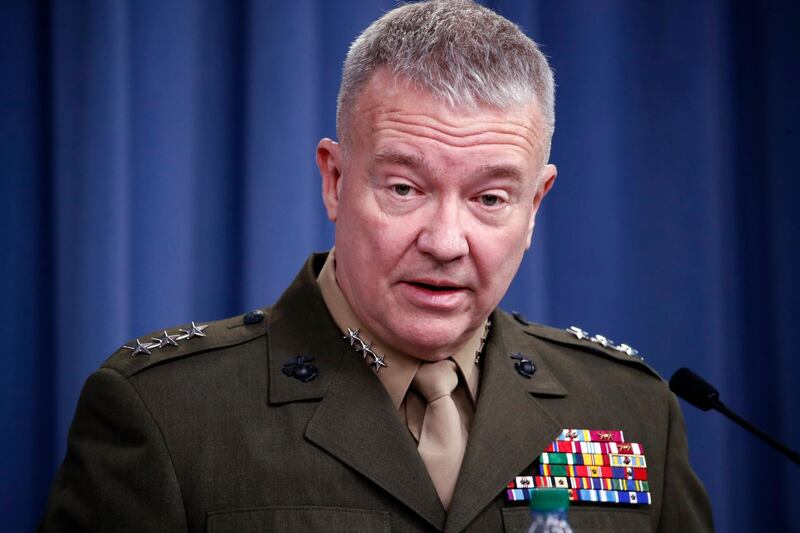Iran has chosen to "step back and recalculate" after making preparations for an apparent attack against US forces in the Arabian Gulf region, but it is too early to conclude the threat is gone, the top commander of American forces in the Middle East said on Thursday.
In an interview with three reporters accompanying him to the Gulf, General Frank McKenzie said he remains concerned by Iran's potential for aggression, and he would not rule out requesting additional US forces to bolster defences against Iranian missiles or other weapons.
"I don't actually believe the threat has diminished," Gen McKenzie said. "I believe the threat is very real."
Gen McKenzie, the head of US Central Command, and other military officials are trying to strike a balance between persuading Iran that the US is prepared to retaliate for an Iranian attack on Americans, thus deterring conflict, and pushing so much military muscle into the Gulf that Iran thinks the US plans an attack, in which case it might feel compelled to strike preemptively and thus spark war.
Tensions between the US and Iran have worsened since President Donald Trump withdrew from a 2015 nuclear agreement between Iran and several world powers, and reinstated sanctions on Tehran. Last month, in response to what American officials characterised as an imminent threat, the US announced it would rush an aircraft carrier and other assets to the region.
"It is my assessment that this has caused the Iranians to back up a little bit, but I'm not sure they are strategically backing down," Gen McKenzie told reporters.
The general said the US is showing enough force to "establish deterrence" without "needlessly" provoking its longtime adversary. "We're working very hard to walk that line."
He said he is confident in the moves he has made thus far.
"We've taken steps to show the Iranians that we mean business in our ability to defend ourselves," he said, referring to the accelerated deployment to the Gulf area of the USS Abraham Lincoln carrier strike group, four Air Force B-52 bombers and additional batteries of Army Patriot air-defence systems.
Mr Trump, speaking beside French President Emmanuel Macron in Caen, France, said US sanctions are crippling Iran's economy, possibly yielding a diplomatic opening.
"And if they want to talk, that's fine," the US president said. "We'll talk. But the one thing that they can't have is they can't have nuclear weapons."
Speaking at the Baghdad headquarters of the US-led coalition fighting the Islamic State group in Iraq and Syria, Gen McKenzie said he also has repositioned surveillance aircraft to more closely monitor the situation in the Gulf and in Iraq, where the US has 5,200 troops on the ground, and has given Iran a "new look" by introducing more aerial patrols by land- and carrier-based fighters.
"Cumulatively, all of these have caused them to sort of step back and recalculate the course that they apparently were on," he said.
Gen McKenzie did not mention it, but other officials have said that in early May Iran had cruise and perhaps short-range ballistic missiles configured for potential use aboard a small number of dhows sailing off its coast. More recently, those missiles, which were deemed a potential threat, were offloaded, officials have said.
McKenzie stressed that the danger of conflict with a decades-old American adversary has not passed.
"I hesitate to say that deterrence has been established," he said. "We continue to see possible imminent threats" of a potential Iranian attack. He said he could not be more specific due to the classification of the intelligence, which he said is as clear and compelling as any he has seen in years.
Gen McKenzie, a veteran of combat in Iraq and Afghanistan, took command of Central Command in late March, shortly before the onset of the latest surge in tensions with Iran. He previously directed the staff that supports the chairman of the Joint Chiefs of Staff.
The general said he - not the White House - initiated the May 5 moves to accelerate the deployment of the Abraham Lincoln carrier group and to dispatch B-52 bombers.
He said the intelligence on Iranian threats in the first days of May was "compelling" and that the threats were "advanced, imminent and very specific."





